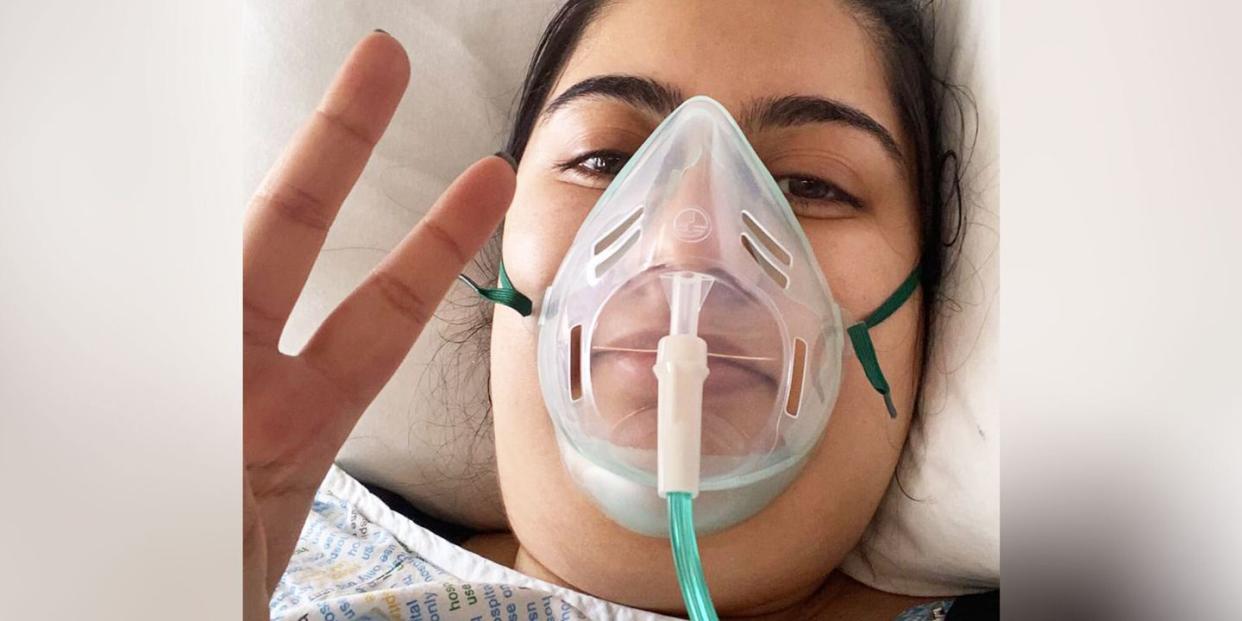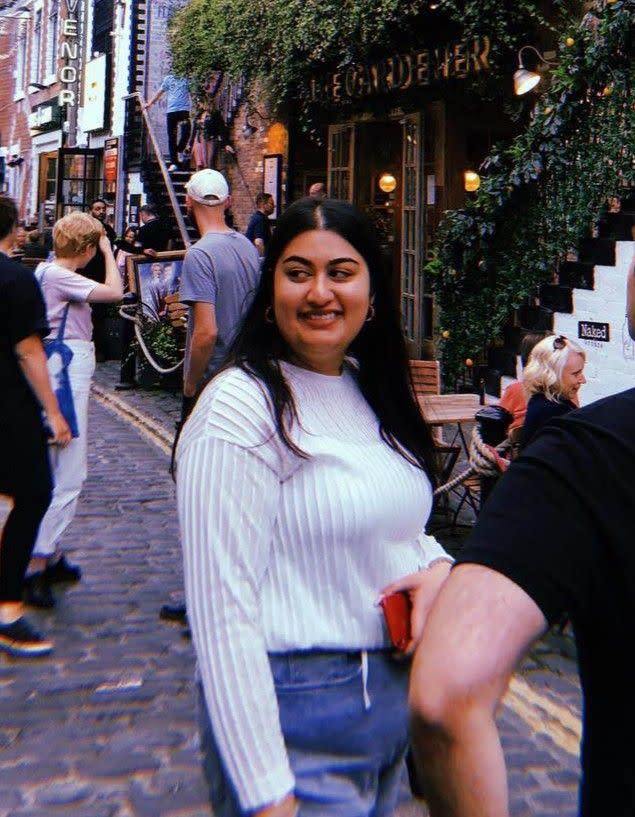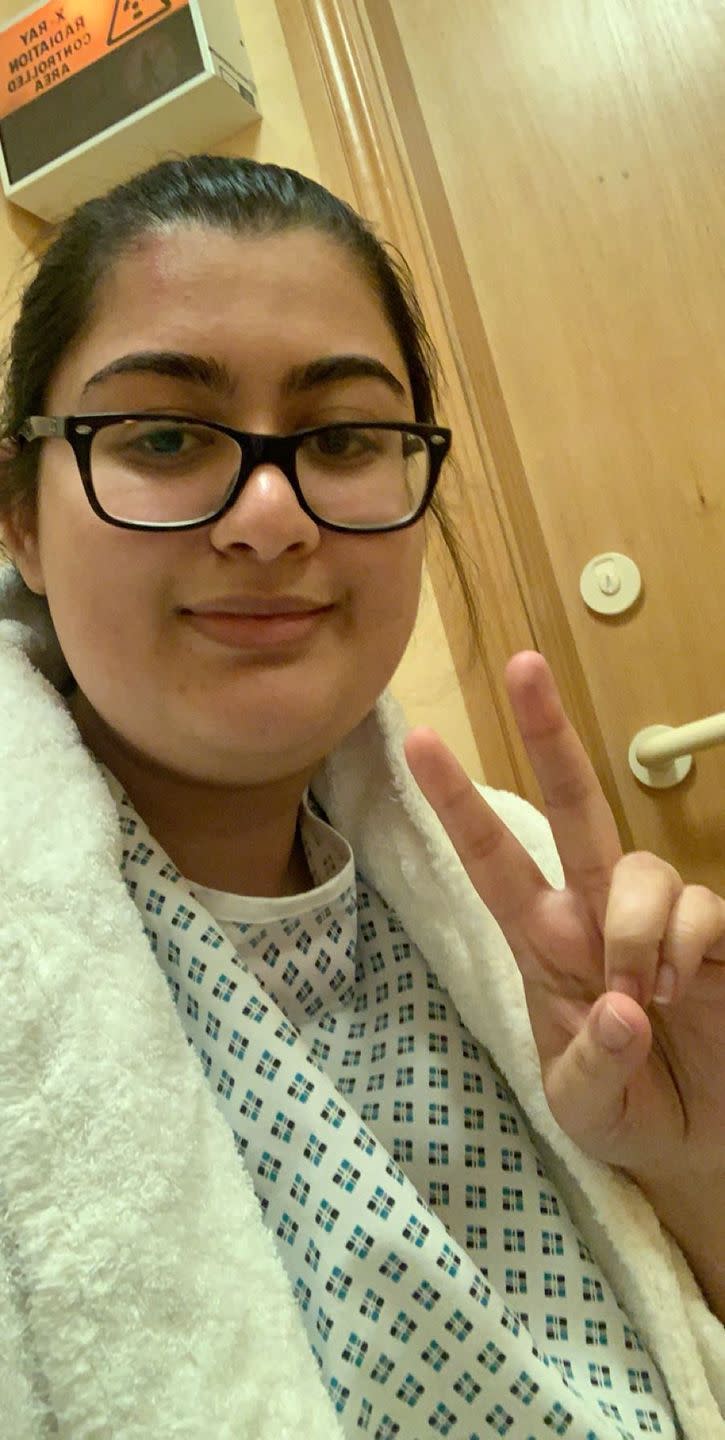Doctors Said My Abdominal Pain Was Just Constipation. I Actually Had Severe Ovarian Cysts.

In October 2019, I was 23 years old and working full time as a client advisor in the financial services industry and running my own businesses. I’m a personal shopper and I have an eyewear company, so my days would usually be packed from beginning to end.
One day, I started to experience a dull cramping pain in my lower abdominal area, almost as if my period was about to start. Over the next two weeks, the pain began to intensify, until one night I woke up at 3 a.m. with excruciating pain that radiated from my lower right abdomen, around my side and back, and down my right leg. Given my hectic life, I became overwhelmed and nervous about this pain sidelining me further and sought out my doctor.
When I went to a primary care doctor for help in late October, he told me that I must be constipated (despite the fact that I was completely regular). Knowing this, I was slightly skeptical, but since this person had practiced medicine for years, I figured he knew what he was talking about.
For the next several months, the pain kept coming back.
The second time I visited the doctor, he still insisted I was probably just backed up and prescribed a laxative and over-the-counter pain medication. I followed his orders, but doing so didn’t even scratch the surface of the pain I was experiencing.
So, I called to get checked out again. This led to a series of about eight appointments, during which the doctor tested me for intestinal parasites, celiac disease, inflammatory bowel disease, kidney stones, and a slew of other suspected health conditions.

In December 2019, with no diagnosis in sight, I was exhausted and frustrated.
Sometimes the pain was so intense I couldn’t sleep or eat for days at a time—which is not an ideal situation when you’re working a ton and running businesses. Even drinking water could make me feel uneasy and nauseous. In an attempt to dull the pain, I put hot water bottles on my lower abdomen so frequently that my skin had begun to blister as a result of overexposure to heat. All out of ideas, I was finally referred to the local hospital for more help.
There, a doctor took my vitals and examined my stomach. He asked me to rate my pain on a scale of one to 10, and I told him it was an eight, assuming that it could always get worse. In response to this, he remarked that I wasn’t “screaming in pain,” as if my pain wasn’t as bad I was suggesting it was. I didn’t even react to this.
I felt defeated, like I was fighting a losing battle, and the people who were supposed to be fighting for me—my doctors—weren’t helping. After a urine test, the doctor told me he suspected that I might have a urinary tract infection (even though it did not burn when I peed), so he gave me some antibiotics and sent me home.
Two weeks later, the pain returned. It would come in waves that lasted for about three days at a time every couple of weeks or so. Although the pain was unbearable, at this point, I was almost used to it. I remember thinking this recurring pain would continue for the rest of my life, that I’d never have a “normal” life again. I was even afraid to leave my house at times, knowing that the pain could strike out of nowhere and leave me unable to move in the middle of running errands or shopping.
By April 2020, I couldn’t take it anymore. I was admitted into the hospital in the midst of the COVID-19 pandemic.
It had been half a year of cycling in and out of severe abdominal pain, and I had hit my breaking point. And as you can imagine, tensions were extremely high.
When my mother and brother drove me up to the hospital, they had to drop me off. Masked attendants asked why I had come there and if anyone in the car or at home had been experiencing any symptoms of the novel coronavirus. I was instructed to enter the hospital alone, and I was the only person in the accident and emergency section other than the receptionist.
After I was admitted, I had the usual vitals check and a female gynecologist gave me a pelvic exam as well as an ultrasound. The imaging revealed that I had two ovarian cysts, or fluid-filled sacs, one on my left and right ovary.
Unfortunately, there was apparently no specific reason why I got ovarian cysts—some women just develop them. While many women can take pain medication and watch and wait until their ovarian cysts go away or become too large or painful to handle, the cyst on my right ovary had caused it to twist (known as an ovarian torsion). When this happened, the blood supply to my ovary was cut off—which could eventually result in the death of my ovary.

At that point, my pain was clearly unbearable and I was not going to go home without a solution. I was told that they would not be able to schedule a surgery for the removal of my cysts due to the pandemic, as I wasn’t considered a priority case. For the first time, I cried in front of my doctors and begged for some kind of pain relief. Honestly, I believe this was the first time they truly understood just how much pain I was in. They gave me an injection of morphine.
After the first full day I spent in the hospital, I felt like maybe I was improving, so my doctors discussed discharging me soon. However, the next day, another wave of pain came. I was given more morphine. By my third day in the hospital, a female doctor told me she was trying to find someone who would carry out my surgery, as she didn’t feel comfortable sending me home in my condition. I cannot even describe the relief I felt hearing that. I’m forever grateful to this doctor.
One day later, I was rolled in for my surgery. The surgeon discovered that my right ovary had completely twisted around and was dead. The cyst had completely engulfed my ovary, so my ovary and the fallopian tube attached to it had to be removed. The smaller cyst on my left ovary was removed as well.

When people ask me how I’m doing in the wake of this experience, I always say that the physical recovery is only one half of the story.
I’m 23 years old and I only have one ovary. It’s not the end of the world, but I can’t help but wonder: In 10 years, if I decide to have children, will I have difficulties? I’m also afraid that the pain will come back someday and, again, no one will believe it’s real.
Sometimes as a young woman, I feel like people don’t take me seriously, and this was no different. While I love my job in financial services, there are times when others look at me and seem to say in their head, “Does she really know what she’s talking about?” or, “How old is she?” I shouldn’t have to deal with this anywhere, but especially not in the doctor’s office. Yet when I expressed that I was having a medical issue, I felt judged or blown off multiple times throughout this health crisis.
I want other women to know how important it is to trust your instincts and stand your ground. Don’t be afraid to really stress to your doctors how serious your symptoms are. It was only once that I started crying and showing my frustration and pain that doctors realized they had to do something for me. By the time I ended up in the hospital, I could no longer fight for myself. I was too exhausted. I’m lucky that I found a doctor who fought for me.
You Might Also Like
